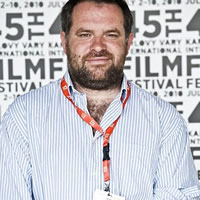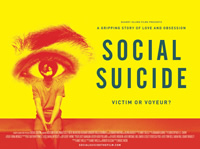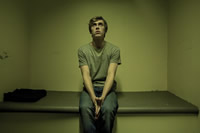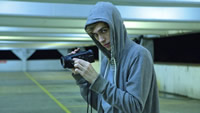We will all end up big and fat
 17-year-old Balthazar constantly films his friends on the streets or at parties and puts his material online. When one morning two teenagers are found dead, Balthazar’s footage becomes important evidence for a police officer trying to reconstruct the crime. Will Balthazar become an indispensable element in the police investigation or will his voyeuristic habits now turn against him? In SOCIAL SUICIDE, vaguely structured as a contemporary ‘Romeo & Juliet’ story, director Bruce Webb (THE BE ALL AND END ALL) shines a light on youngsters’ abuse of power in today’s world of social media.
17-year-old Balthazar constantly films his friends on the streets or at parties and puts his material online. When one morning two teenagers are found dead, Balthazar’s footage becomes important evidence for a police officer trying to reconstruct the crime. Will Balthazar become an indispensable element in the police investigation or will his voyeuristic habits now turn against him? In SOCIAL SUICIDE, vaguely structured as a contemporary ‘Romeo & Juliet’ story, director Bruce Webb (THE BE ALL AND END ALL) shines a light on youngsters’ abuse of power in today’s world of social media.
Bruce Webb: Some frightening trends have emerged from youngsters’ changes in media usage. At home Balthazar finds no love. Still he feels the need to be wanted, which he tries to achieve through getting famous on the internet. He’s obsessed by the race for the most clicks and hits.
 Mostly such actions happen ‘under the police radar’. Do we only see the tip of the iceberg?
Mostly such actions happen ‘under the police radar’. Do we only see the tip of the iceberg?
Bruce Webb: While the government is watching us, we’re all watching each other, parents and children alike. We’re obsessed about imagery, and it’s accelerating faster and faster. In Britain a trial started against a guy using spyware to control people’s webcams. With software he simply bought online, he was filming all of his friends masturbating. It’s very real, it’s happening all the time. I don’t know if SOCIAL SUICIDE is a reflection on society or a warning for children. But I guess that if you’re a 12 year old girl watching the film, it might make you think a bit more.
One way or another you apply to our sympathy for Balthazar’s character.
Webb: The credit goes to the actor Jackson Bews, who did a marvelous job. We shot the film very quickly, completely out of order. Constantly going backwards and forwards in the script, Jason always knew exactly where he was. The original Romeo & Juliet is a very old Roman play about two cousins living in one room with a wall between them. They fall in love, seeing each other through a crack in that wall. Shakespeare took this idea and made the wall the two different families: Capulets and Montagues. When developing the script I was looking for something to replace that wall, and that was Balthazar.
 What about the scratch on his nose?
What about the scratch on his nose?
Webb: That thing was a nightmare. It had to be reset all the time, the make-up artist was very unhappy with it. But it sets a period in time. Balthazar gets it during the ‘car park argument’, which is a key moment to which everything in the film refers. The scratch is like a time stamp.
The film has a surprisingly subtle sound design.
Webb: SOCIAL SUICIDE is shot mainly in one room, a police cell and a hospital room. In these small spaces I wanted to create a feeling of claustrophobia. That’s why the film starts very silently. There is practically no music till the last 30 minutes and the camera stays far away. When the camera starts closing in, the sound design becomes denser: layers and layers of atmospheric sound, building up towards a big finale.
 How did you translate the computer screen on to the big screen?
How did you translate the computer screen on to the big screen?
Webb: We were using 5 different types of cameras. A lot of thought went into which camera to choose for which period in time. We finally decided not to use camera phones, as we wanted the film to have cinema quality, and to have a longer life. That’s also the reason for not specifying any social media and not showing their logo’s, as such elements can quickly become outdated.
The coolest guys in the film are the computer specialists working at the police station.
Webb: I happen to work on a long-running TV-show about people being murdered, for which I interviewed forensic experts, psychologists and toxicologists. We would have loved to show lots of computer screens in a central control unit. But actually in real life those guys are sitting at old computers, doing old fashioned police work. Guys like IT expert Hughie, they do exist. They are civilians, sometimes with a criminal past, like hackers who have changed their ways. Hughie starts as a guy who loves violent, sexual videos, but by the end of the film he simply can’t watch them anymore.
 How do you think the nature of love relationships is going to change through the online world? Will love become ‘public domain’?
How do you think the nature of love relationships is going to change through the online world? Will love become ‘public domain’?
Webb: Some things haven’t changed. Teenagers still send each other notes, exactly like when we were young. What has changed in the last 10 years are the visual media. We come from not being able to video anything without a large camera, to now videoing with cameras in the size of a pen. And when putting the pictures online, within 30 seconds billions of people could have seen them. This could be used to threaten and blackmail people. In the UK every week we have another suicide case due to sexting (= sharing sexually explicit messages and pictures on mobile phones), and the numbers for self-harming, eating disorders and body dysmorphia have hugely increased. It’s in the interest of the worldwide economics to keep us the way we are: the government and the industry want us to stay at home and consume, and we’ll all end up big and fat and facing health problems. It seems like all those wonderful movies like BLADE RUNNER, I ROBOT and WALL-E are now coming true.
 The movie introduces us to the ‘slut/stud’ forum, which is a very gender-related thing.
The movie introduces us to the ‘slut/stud’ forum, which is a very gender-related thing.
Webb: Social media has a big impact on the changes in society. Traditional British newspapers still have a very male dominated view: there is a lot of sexualisation and we even have newspapers where women have their breasts out. But in social media it’s our own opinions that count. In the slipstream of a movie like SUFFRAGETTE, fans are writing about women’s rights, and men can’t help but read these posts. Female beauty bloggers have millions of hits. At first it was exciting to hear these original, independent voices, but now the corporations are taking over, sponsoring millions of pounds. Once corporations get involved, they bring along forms of censorship. If bloggers might comment for instance on the situation of women’s rights in Saudi Arabia, chances are real that the corporations will forbid it because of the commercial connections they have with the country.
When you look into your crystal ball, what do you see?
Webb: There is something fundamentally different to the world now we can watch people being brutalized and killed online. IS is using social media with an amazing effect. They’re being watched because of the snuff movies they make. Five years ago we could have never imagined seeing videos of people being killed. Now we might become desensitized, because of the law of diminishing returns. What if we are no longer shocked by such pictures and we’re so dulled that we’ll be looking for even more extreme excitement online?
Could you, as a UK based director, give me one good reason to enter the minefield that is called ‘filmmaking for children’?
Webb: In the UK we have no distribution system for children’s film, we have no government policy for children’s film and we have nobody wanting to finance children’s film. We hardly have a slot for children’s television! Children’s TV is now put on a niche channel, and with the possible privatizing of Channel 4, our last place for young audiences on TV is probably about going to go. Since British cinemas are some of the most expensive in Europe, children are finding their entertainment online. They’re only fed with Hollywood movies with very obvious storylines. These children probably wouldn’t understand a more art-house-based type of cinema about a challenging subject. I have to come to festivals like Schlingel or Alekino to see young and adult people getting excited about European children’s films. Teenagers in Britain don’t see their lives reflected on TV or in film in day-to-day life, and that’s why I think it’s important that films like SOCIAL SUICIDE get to be made.
Gert Hermans
